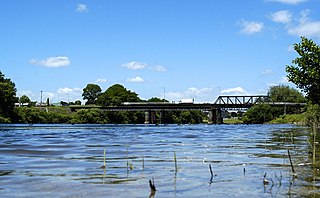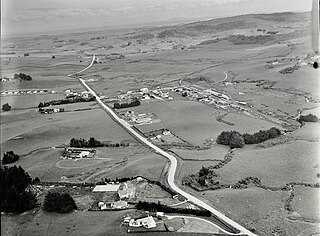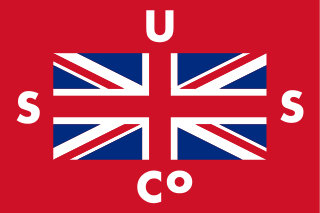Government House is the name of many of the official residences of governors-general, governors and lieutenant-governors in the Commonwealth and British Overseas Territories. The name is also used in some other countries.

Sir Charles Edward Kingsford Smith, nicknamed Smithy, was an Australian aviation pioneer. He piloted the first transpacific flight and the first flight between Australia and New Zealand.

Ngāruawāhia is a town in the Waikato region of the North Island of New Zealand. It is located 20 kilometres (12 mi) north-west of Hamilton at the confluence of the Waikato and Waipā Rivers, adjacent to the Hakarimata Range. Ngāruawāhia is in the Hamilton Urban Area, the fourth largest urban area in New Zealand. The location was once considered as a potential capital of New Zealand.

Kirribilli House is the secondary official residence of the prime minister of Australia. Located in the Northern Sydney suburb of Kirribilli, New South Wales, the cottage and its associated grounds are located at the far eastern end of Kirribilli Avenue. It is one of two official prime ministerial residences, the primary official residence being The Lodge in Canberra. The house, gardens and grounds are on the Commonwealth Heritage List.

The Government Buildings in Suva are the offices of the executive wing of Government of Fiji. Built in the late 1930s as the seat of the colonial administration, the Art Deco buildings today house the Prime Minister of Fiji's offices, the High Court, and several government ministries. It is also the seat of the Parliament of Fiji since 2014, having previously been the seat of Fiji's parliament from independence in 1970 until the 1987 coups.

The Stillwater Ngākawau Line (SNL), formerly the Stillwater–Westport Line (SWL) and the Ngakawau Branch, is a secondary main line, part of New Zealand's national rail network. It runs between Stillwater and Ngakawau via Westport on the West Coast of the South Island. It was one of the longest construction projects in New Zealand's history, with its first section, at the south end, opened in 1889, and the beginnings of the Ngākawau Branch, at its Westport end, in 1875. The full line was completed in 1942. The only slower railway projects were Palmerston North to Gisborne, 1872 to 1942, and the Main North Line to Picton, 1872 to 1945.
Hannah Dudley (1862–1931) was a Methodist mission sister who worked amongst Indo-Fijians in the Suva area of Fiji for 13 years. She had few educational qualifications but was revered for her kind-heartedness and self-sacrifice. Indo-Fijians in Suva called her Hamari Mataji. She did her work with dedication but was sometimes eccentric and independent minded.

The Embassy of Finland to the Commonwealth of Australia is Finland's diplomatic mission in Canberra, Australia. The mission is also accredited to New Zealand, Fiji, Papua New Guinea, Samoa, Tonga, Vanuatu and the Solomon Islands. As it is the only Finnish Embassy in the Southern Pacific region (Oceania), in practice the embassy also represents Finland in its relations with other Pacific island states in the region.

Tokanui is a community in the eastern portion of Southland District Council, located on the Southern Scenic Route about 56 km (35 mi) east of Invercargill and 107 km (66 mi) southwest of Balclutha, New Zealand. The Tokanui River runs just to the north of the village and occasionally floods the lower parts, as it did when the railway yard flooded in 1935.

Union Steam Ship Company of New Zealand Limited was once the biggest shipping line in the southern hemisphere and New Zealand's largest private-sector employer. It was incorporated by James Mills in Dunedin in 1875 with the backing of a Scottish shipbuilder, Peter Denny. Bought by shipping giant P&O around the time of World War I it was sold in 1972 to an Australasian consortium and closed at the end of the twentieth century.

The Grand Pacific Hotel is a historic hotel built in 1914, located on the main sea front, on Victoria Parade in Suva, Fiji.

The Glen Afton Branch was a branch railway line of 7.9 km in the Waikato in New Zealand, built to serve coal mines in the Awaroa district west of Huntly at Rotowaro, Pukemiro and Glen Afton. Rotowaro is Māori for "coal lake".

Lyra Veronica Esmeralda Taylor was a New Zealand lawyer and social worker. She spent much of her career in Australia.

Otorohanga railway station serves the town of Ōtorohanga, on the North Island Main Trunk in New Zealand. The current station dates from 1924.

The Northern Steam Ship Company Ltd (NSS) served the northern half of the North Island of New Zealand from 1881 to 1974. Its headquarters, the Northern Steam Ship Company Building, remains in use on Quay Street, Auckland as a bar and is listed by Heritage New Zealand as a Category I Historic Place.

The Alexandria Town Hall is a heritage-listed town hall located in Alexandria, New South Wales, Australia. It stands at 73 Garden Street. It was built in 1880–81 in the Victorian architectural style by Ferdinand Reuss Snr. Significant alterations which changed the facade to an Inter-War Free Classical style were completed in 1928 by architects D. T. Morrow and Gordon. The Town Hall was the seat of Alexandria Municipal Council from 1881 to 1948 and since 1948 has been a branch library, community centre and council depot for the City of Sydney and the South Sydney councils.

Ngāruawāhia railway station was at the junction of the North Island Main Trunk line and its Glen Massey branch, serving Ngāruawāhia in the Waikato District of New Zealand, 74 mi (119 km) south of Auckland and 10 mi (16 km) north of Hamilton. It was opened with a special train from Auckland on Monday 13 August 1877. The next stations were Taupiri 6.5 km (4.0 mi) to the north and Horotiu 5.5 km (3.4 mi) to the south.

George Holdship (1839–1923) emigrated to Auckland in 1855 and became a businessman, mainly involved in timber logging and sawmills. His companies removed much of North Island’s native forest, initially kauri and later kahikatea. He moved to Sydney in 1913.

Whitmore Street is at the boundary of the central business district and the government buildings area of Wellington, New Zealand's capital. The street runs almost north-south and is one of those linking Lambton Quay, Wellington's main shopping street, with Stout Street, Featherston Street and the harbourside at Customhouse/ Waterloo Quay. It is in the suburb of Pipitea.



















